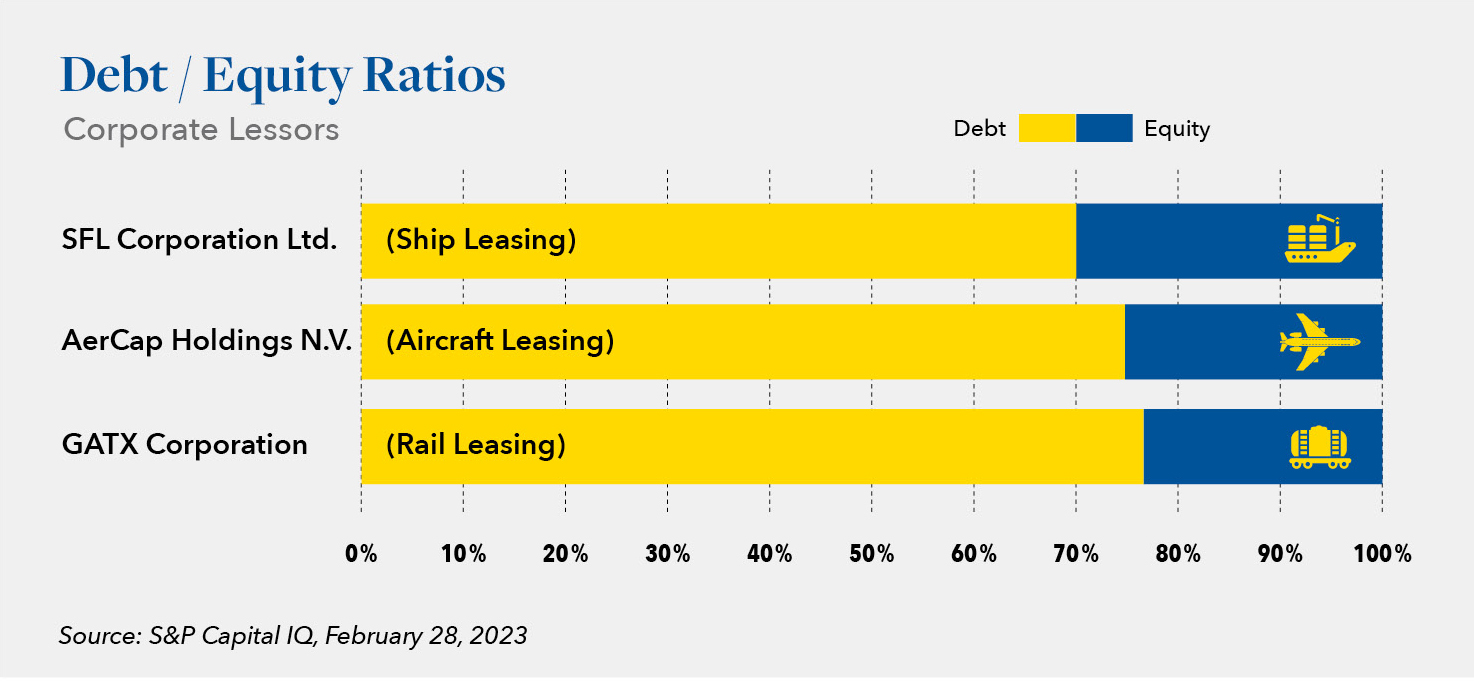Are You Ready for Takeoff? Big Ticket Transportation Assets Offer Unique Investment Opportunities

What Are Big Ticket Transportation Assets?
If it can move large numbers of people or products and doesn’t use a road to do so, then it is likely a big-ticket transportation asset. In the context of financial investments, this most-commonly refers to commercial aircraft, shipping vessels and freight railcars, but the term may also include business jets, helicopters, locomotives and shipping containers.
Much like other transportation assets, these big-ticket assets are often leased by operators for capital management purposes to enable operational nimbleness and mitigate against obsolescence. Two key factors truly differentiate these assets and make leasing them highly attractive. First and foremost, these assets are very expensive. As the big-ticket name implies, this means big dollars, such as $300 million for a single wide-body aircraft, or $175,000 each for an oil tank car for which a railcar operator might need thousands of units. The other key factor is that these assets can operate for a very long time, typically 20 to 30 years for aircraft and shipping vessels, and as long as 50 years for railcars. Given these distinct characteristics, operators of these assets often choose not to outright own their entire portfolios, or, for that matter, own any of them at all. Herein lies the opportunity for a wide range of financial players, including private equity firms, hedge funds, pension funds, securitization originators and issuers, banks and pure-play corporate lessors, to achieve solid returns while providing a valuable financial service to operators.
Additionally, within a given asset class and across asset classes in general, there is an opportunity to add diversification in order to mitigate risk. Commercial aircraft can serve passengers or freight and can be sized to serve short “puddle jumper” flights or 15-hour international routes. Shipping vessels, such as oil tankers, bulkers, container ships and car carriers, to name just a few, are often very specific to their product type and characteristics. Railcars are by far the most diverse, with more than 100 varieties in use, many of which are dominated by highly-specific non-market correlated commodities.

What Keeps These Investments Moving?
The beauty of big-ticket assets is that leases are typically structured as operating leases, advantageously placing the owner (the lessor) in a secured position in a fixed income-like arrangement in which it is not unusual to see 10-year terms. Even better, these assets may well have many of their best economic years still ahead of them following that period, as re-lease and purchase options are often attractive to operators, particularly when the assets are considered business essential.
It is also important to note these assets are generally fueled by GDP-growth and the maturity of developing economies. Given their long-term nature, they can effectively ride out economic cycles, enabling their owners to lever up significantly. Paired with equity returns that can readily exceed 20%, big-ticket transportation assets offer a unique opportunity to diversify a portfolio.

Other investment opportunities are also available. Most notably within a given big-ticket asset class, leases may be packaged together as asset backed securities. In the shipping industry, beyond leases (known as charters), the market has a highly active and lucrative short-term charter and spot-market. These vessels may also operate as actual pools, addressing the one-off episodic needs of operators.
Additionally, big-ticket assets are highly capable of more fully optimizing returns on their initial purchase prices, as investment exits typically occur through private treaty transactions. As such, sales proceeds on a relative basis are higher than smaller-ticket transportation assets such as over-the-road vehicles, which sell via auction or through a third party.
Should I Expect Turbulence?
History tells us yes. The beauty of big-ticket assets though is that investors don’t necessarily need to race the clock in terms of short normal useful lives, and annual depreciation generally only averages in the low single digits. This means time is on your side, so you can ride out a recovery and avoid locking into onerous leases or selling assets in a down market. Commercial aircraft values seemed all but done for when COVID-19 lockdowns brought airline passenger travel to a screeching halt. Yet, within the three years since, values of the most popular aircraft variants have returned back in line with pre-pandemic levels, and thanks in part to state-sponsored rescue plans across the globe, very few airlines went under.
Big-ticket assets are highly regulated by safety and environmental authorities, such as the Department of Transportation (DOT) and the Federal Aviation Authority (FAA) in the United States and the International Maritime Organization (IMO). The most public example of this oversight in recent years was the Air Worthiness Directive issued for Boeing’s 737-Max variant, which was ultimately grounded for nearly two years. In 2020, regulation from the IMO impacted shippers’ ability to operate using high-sulfur fuel. Over the past several years, the rail industry has faced multiple regulations that have impacted tank cars carrying certain volatile substances, and could very well bring further actions. While these external forces have the potential to impact big-ticket assets, it goes without saying, that other investment options are not immune to similar forces in different forms. This, of course, is why investor strategies should always include thoughtful diversification.
What Keeps Things From Going Off The Rails?
As previously mentioned, operating leases provide secured position lending with a fixed-income-like arrangement. While credit risk should always be monitored closely, there are often industry-standard safeguards that big-ticket lease contracts will incorporate, all with the purpose of protecting the asset’s physical condition. This includes maintenance escrow programs to ensure funds are set aside and secured for compliance with routine and regulated maintenance requirements and to address potential maintenance needs should an asset repossession event occur.
Are You Ready To Set Sail?
Big-ticket assets require significant capital, but there are also multiple ways for an investor to dip a toe in the water. Minority stakes and investments in used mid-life assets and small fleets are all common methods that current major players have used in the past to cut their teeth. The long-term nature of the assets themselves, the myriad of methods available to monetize them under a secured-fixed-income-like operating lease structure, the high-yield proceeds at disposition as well as the overall market fundamentals drive big-ticket asset performance. Collectively, this makes them ideal assets for investors to consider as they expand and diversify their portfolios.
Hilco Enterprise Valuation Services (HEVS) provides a range of enterprise valuations services to businesses and their stakeholders. Our professionals advise companies, lenders, investors, counsel and other professional advisors, and fiduciaries on the realizable value of enterprises, financial instruments, and cash-generating assets in a broad range of matters, including M&A transactions, debt and equity financings, transaction opinions, intellectual property valuations, ESOPs, financial reporting and compliance, special situations, and tax matters. In addition to its core valuation services, HEVS provides disputes and litigation consulting services, including expert witness testimony, on valuation-related issues in commercial and bankruptcy litigation. HEVS is the business valuation affiliate of Northbrook, IL-based Hilco Global.
— Alternate version posted in ABFJournal —




